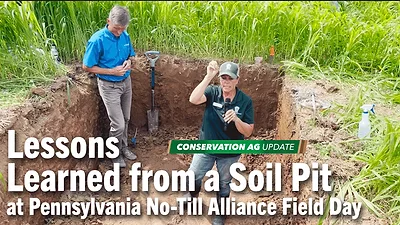During a roundtable discussion Tuesday about the Make America Healthy Again agenda, agricultural leaders in Washington said soil health, and practices such as no-till, strip-till and precision agriculture, are key to building a modern food system that focuses on human health.
In a report by Agri-Pulse, USDA Secretary Brooke Rollins emphasized the role the NRCS — founded 90 years ago — in supporting farmers through a voluntary transition to regenerative farming practices like no-till, strip-till and planting cover crops.
Department of Health & Human Services Secretary Robert F. Kennedy Jr. spoke about the state of soil health in the U.S., Agri-Pulse reported. Kennedy said topsoil is disappearing more quickly than it is replaced, placing farming in further jeopardy in the coming decades.
Kennedy and the MAHA movement have also been sharply critical of what they term as excessive pesticide use on U.S. farms – specifically glyphosate and atrazine.
“We have farming practices now that are unsustainable. They’ve been dictated by, in many ways, by federal policies and we need to transition,” Kennedy said during the event. “But we need to transition without mandates, without coercion.
“We need to give off ramps to farmers so that they can transition to biodynamic agriculture, to regenerative agriculture, and do it in a way that is going to maintain the vibrancy of their farms and robust economies in rural communities across our country.”
U.S. Senator Roger Marshall, M.D. (R-Kansas) hosted Kennedy and Rollins alongside farmers and agriculture experts for the roundtable on Capitol Hill. Marshall is chair of the Senate Agriculture subcommittee on Conservation, Natural Resources & Biotechnology and has championed better agriculture practices and healthier foods. He is also the founder of both the MAHA Caucus, and the Food is Medicine Caucus.
Some of the notables at the roundtable were Ray Flickner, who was named as the 2025 Strip-Till Innovator of the Year by Strip-Till Farmer magazine; Blaine Ginther, founder of SureFire Ag, and Chuck Rice, distinguished professor of soil microbiology at Kansas State University.
MORE COVERAGE
- MAHA Report Points Fingers at Pesticides, Farm Industry Responds
- MAHA Perception Among Consumers Favorable, But Politically Polarizing
- Activists Take Aim at 'Pesticide-Soaked' No-Till
In his opening statement, Marshall said he believes soil health is the “bridge where agriculture meets MAHA. It’s where healthy soil meets healthy food meets healthy people,” Agri-Pulse’s report said.
“It’s also my belief that we must work as one team to forge public-private partnerships between farmers and federal government policies to achieve healthy soil and healthy, affordable nutrition.”
The first much-anticipated Make American Healthy Again report assessing key drivers of childhood disease across the U.S. was released in May. It placed at least some of the blame on farmers’ use of labeled, approved crop protection products.
DHHS touted the 68-page report generated by a presidential commission as “exposing a range of contributing factors” in childhood chronic disease, including poor diet, accumulation of “environmental toxins, inadequate physical activity, chronic stress and over-medicalization.”
The report specifically called out the presence of glyphosate, chlorpyrifos and atrazine in food, water and dust, along with household products, for contributing to childhood health issues. MAHA said the assessment, “arms stakeholders and partners and partners with clear evidence that will support the development of effective policy interventions where they can deliver the greatest impact.
But the first report was heavily criticized by farm groups because of its criticism of crop protection products used in food production by farmers. Marshall said the second MAHA report containing policy recommendations is expected to be released on Aug. 12.
CLICK HERE to read more about Ray Flickner's strip-till operation.






